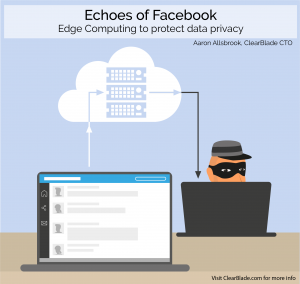Echoes of Facebook: Edge computing to protect privacy
Facebook recently admitted that almost all of its more than 2 billion user accounts have been scraped and used for any number of advertising or manipulative purposes. Users, congress and the press have reacted with outrage, canceling their accounts or issuing stern warnings.
The reality is that the sharing of personal/private data is something we all agreed to many years ago when we signed up for Facebook. As Sharon Sandberg so coldly delivered, Facebook could have simply charged users instead of selling their data.
A privacy nightmare in our home
Leaking your brand preferences, political affiliation and cultural bias so that you can be manipulated is bad, but it’s not the worst part. The scariest thing happening right now is that we, consumers, are blindly trusting and sharing even more data about ourselves every day, and the same reporters and politicians demanding change are also ignorantly pushing people into the arms of a much worse privacy nightmare.
The smart home devices from Google, Amazon and Apple are nothing more than live snooping agents collecting more of our personal data. The purchase of these devices doesn’t cover the cost of the servers and computation that’s going on in the background. Alexa is not making our lives better out of charity; Amazon is injecting itself into our lives to be able to understand and monetize our data for years to come by being in our home, with the ability to listen to every conversation, comprehend our every request, hear our best and worst parenting moments …
If we continue on the monolithic cloud path that Amazon, Google, Apple, Facebook and Microsoft are pushing us toward, things don’t get better — more of our data gets compiled, aggregated and used by big companies. Things get worse. These companies won’t make things better, and it’s up to an ecosystem of innovative disruptors to find a better way.
Edge computing to protect privacy
Good news; we see the beginnings of a new technology pattern called edge computing that can solve this. Edge applications offer a sea change of technical alternatives for companies and users piling data into big clouds. Edge processing turns the cloud model on its head, using it only as a deployment tool rather than an omnipotent controller. The information no longer goes to a cloud server, gets saved, parsed, interpreted, shared and manipulated. Every transaction is no longer a possible monetization activity for some company to take advantage of user preferences.
Edge computing is different; it allows developers to still create amazing technologies that give people the possibility to interact with their local and wider world capabilities. For example, edge developers build applications that fully run and execute only on local devices where the users are physically present and monitoring. These edge applications are not dumbly spewing relay information like Alexa, but instead are complete and competent on their own. Three core elements are different with edge processing over monolithic clouds:
Data stays local
When an edge application runs, it stores its own data. The idea that you need Facebook to store the 2 GB of your profile information is silly. Massive amounts of storage are readily available in the tiniest of forms, and 100s of GB to terabytes can be packed and redundantly backed up with in local devices. These local devices become our storage instead of the corporate hard drives of the clouds.
Applications communicate directly and efficiently
Applications now also have the ability to communicate securely and directly with each other. In the Facebook world, this means that when someone views your profile, it’s not a single server bringing that information forward, but it’s your Facebook app that is serving up the information. Not only is your device able to give a more accurate real-time set of information, it’s actually a source of truth that can be unrivaled.
Secured on the device
Data is not secured according to a cloud vendor’s whim, arrogance and business model. Instead, each edge device and each edge owner gets to define the information they share and how it’s used. This model protects people from an all-or-nothing approach that so many apps require today just to get started. Alternately, your contacts, your messages, and your queries are all actually under your control.
Today we have Amazon Echo devices in our homes gathering data about us as we use those capabilities. To protect and prevent another huge abuse of our data, we must transition from these dumb corporate agents and into a model that protects users. The clouds have been unable to protect; we must transition our architectures to serve and protect people using the edge.
All IoT Agenda network contributors are responsible for the content and accuracy of their posts. Opinions are of the writers and do not necessarily convey the thoughts of IoT Agenda.

